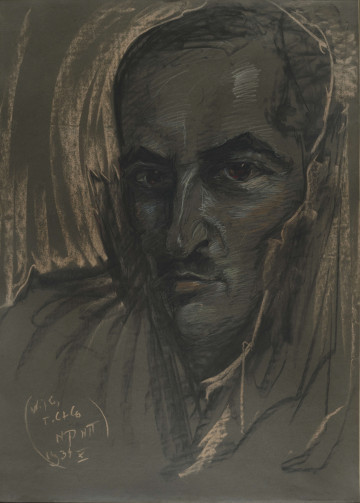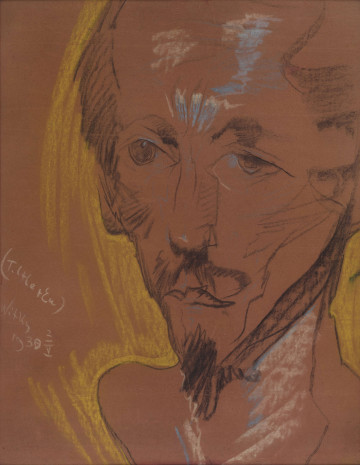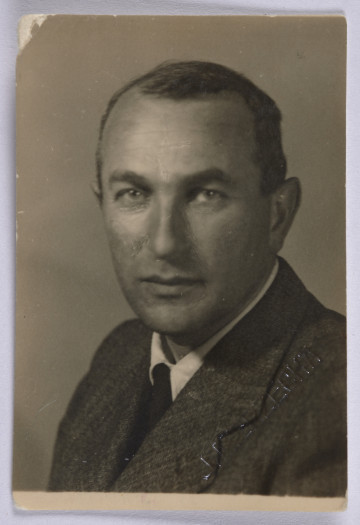
Portrait of Józef Głogowski
1934
National Museum in Lublin
Part of the collection: Stanisław Ignacy Witkiewicz
In 1925, Witkacy devoted himself to the art of portraiture, realised within the framework of the one-man "S.I. Witkiewicz Portrait Company", which was to become a source of quick profit and remedy financial troubles. The artist defined the rules for creating portraits in pastel, charcoal, crayon and pencil techniques in detailed regulations, specifying with the letters A, B, C, D and E the nature of the five basic types and their combinations. He often created them under the influence of psychoactive substances, documenting his state with sign abbreviations. Witkacy painted several dozen portraits of the Fedorowicz family - Józef, his mother, sister, wife and daughters. Fedorowicz settled in Zakopane in 1922, taking the position of the head of the Meteorological Station, hence he was called Wiatr Halny [Halny] or PIMek (from the abbreviation PIM - the National Meteorological Institute). Distinguished by his unusual clothes and sense of humour, he was widely known and liked in Zakopane. He belonged to the close circle of Witkacy's friends, who cast him in his plays produced by the Formist Theatre. His greatest success was the role of Richard III in Nowym wyzwoleniu [New Liberation]. Rafał Malczewski recalls how, preoccupied with the role, PIMek "wearing a velvet beret on his head, which he received from the author, would lurk at night behind the corner of a Zakopane bank to catch up with a friend and, snapping his teeth, play Richard III. This went on for years, a hundred strong winds blew through Krupówki, and Pimek was still haunting, although his whitened hair hung from under his black beret" (Pępek świata. Wspomnienia o Zakopanem [Navel of the Universe. Memories of Zakopane]), Warsaw 1960, p. 82). In 1938, Witkacy entrusted Fedorowicz with the administrative management of the Independent Theatre in Zakopane. According to the artist's annotation, Pimek's portrait represents a relatively rare B+D type, denoting "an intensification of character bordering on a certain caricaturalism, the head larger than life-size". During its creation, the artist helped himself to coffee (Cof) and abstained from alcohol for nine months (NΠ9m).
Anna Hałata
Author / creator
Dimensions
cały obiekt: height: 49,9 cm, width: 64,9 cm
Object type
drawing
Technique
pastel
Creation time / dating
Creation / finding place
Owner
The National Museum in Lublin
Identification number
Location / status

1934
National Museum in Lublin

1930
National Museum in Lublin

1930 — 1939
Museum of the history of Polish Jews
DISCOVER this TOPIC
Museum of King Jan III's Palace at Wilanów
DISCOVER this PATH
Educational path